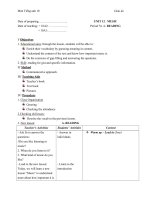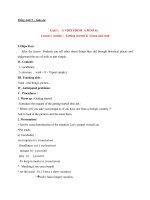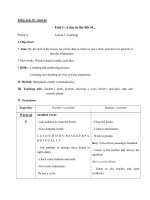Giáo án tiếng anh 10 unit 1
Bạn đang xem bản rút gọn của tài liệu. Xem và tải ngay bản đầy đủ của tài liệu tại đây (132.37 KB, 8 trang )
Tiếng Anh 10 – Giáo án
Unit 1: A day in the life of
Period 4: Lesson 3 :Listening
I. Objectives:
* Aims: By the end of the lesson, Ss wil be able to listen to one’s daily activities for general or
specific information.
* New words: Words related to traffic activities.
* Skills: - Listening and numbering pictures.
- Listening and deciding on True or False statements.
II. Method: Intergrated, mainly communicative.
III. Teaching aids: Student’s book, pictures showing a cyclo driver’s activities, tape and
cassette player.
IV. Procedure:
Stage/time Teacher’s activities Students’ activities
Warm-up
5’
Jumbled words
- Ask students to close the books.
- Give Jumpled words:
C C L O Y, R I E D V, N S S E G E R P A,
D O F O S A L L T
- Ask students to arrange those letters in
right orders.
- Check some students and mark.
- Give some statements:
He has a cyclo.
- Close the books.
- Listen to the teacher.
- Work in groups.
Key: cyclo-driver-passenger-foodstall
- Listen to the teacher and answer the
question:
He is a cyclo driver.
- Listen to the teacher and open
textbooks.
Pre-listening
7’
While-
listening
He drives passenger everyday.
He usually has meal at a foodstall.
- Give question: Who is he?
- If you want to know more details about
daily activities of a cyclo driver, we will go
to Unit 1- part Listening.
Questions and answers:
- Ask students to look at the part: Before
listening.
- Let them work in pairs and make
questions.
- Walk round, listen and help students.
- Read loudly the words:
district; routine; office; drop; passenger; ride
pedal; purchases park footstall.
- Ask students to repeat loudly the words.
- Listen and check pronunciation.
Task 1 Numbering the pictures
- Ask students to look at the pictures about
some activities of Mr Lam, a cyclo driver.
- Let them describe the pictures.
- Read loudly or turn on the tape script three
times.
- Ask students to number the pictures.
- Help them if necessary.
- Look at the books.
- Listen to the teacher.
- Work in pairs.
A: Have you ever travelled by cyclo?
B: Yes, I have.
A: When was it?
B: Last summer.
A: Is it interesting to travel by cyclo?
B: Yes, it is.
- Repeat loudly the words and try to
remember them.
- Keep book open.
- Look at the pictures in task 1.
- Describe the pictures.
- Listen to the tape script and number
the pictures.
Key: a.3, b.5, c.4, d.6, e.1, f.2
- Keep book open and listen to the
teacher.
- Read the sentences in task 2 and try to
understand them.
- Listen to the tape script again and
decide the statements that are T or F
then explain them
Key: 1.F- 2.T- 3.F- 4.F- 5.F- 6.F
20’
After-
listening
10’
Homework
3’
Task 2 T/F statements
- Ask students to look through the sentences
in task 2.
- Ask students to listen to the tape script
again and decide whether the statements are
T or F.
- Ask students to give reasons for their
answers.
Questions and answers
- Ask students to open the books.
- Ask them to ask and answer questions
about Mr Lam’s activities, using the cues
below.
- Let them work in pairs.
- Walk round and help students.
- Ask some students to stand up and retell
Mr Lam’s story to the class.
- Listen and correct mistakes.
- Ask students to write a story about Mr
Lam.
- Prepare Part- Writing at home.
- Open the books.
- Ask and answer about Mr Lam.
A: What’s his name?
B: His name is Lam.
A: What’s his job?
B: He’s a cyclo driver.
- The students who are called stand up
and retell Mr Lam’s story to the class:
Mr Lam is a cyclo driver in HCM city.
He usually has a busy working day. He
gets up at 5.30. ….
Unit 1 : A day in the life of
Period 5: Lesson 4 : Writing
I. Objectives:
*Aims: By the end of the lesson, Ss wil be able to write a narrative by using given prompts.
* Language: The simple past of verbs and the connectors often used in a narrative.
* New words: Words related to problems on a flight or a fire.
* Skills: Writing a narrative.
II. Method: Intergrated, mainly communicative.
III. Teaching aids: Student’s book, notebook, some pictures showing flying accidents of hotel
fires.
IV. Procedure:
Stage/time Teacher’s activities Students’ activities
Warm-up
5’
Pre-writing
10’
Questions and answers
- Ask students to keep book close.
- Ask students some following questions:
1. Have you ever heard a frightening story?
2. When and where did it happen?
3. How did you feel?
- Check and explain them to the class:
There are a lot of accidents in our lives, to
understand them we learn part Writing.
Tak1: Finding verbs
- Ask student to read the narrative in task 1.
- Explain some new words.
- Keep book close
- Listen to the teacher and answer the
questions.
1. Yes, I have.
2. It happened when I was young.
- It happened in my neighborhood.
- It made me frightened.
- Listen to the teacher.
- open the books.
- Read the narrative.
- Ask the teacher if necessary.
- Look through the passage again and find
While-
writing
18’
Post-
writing
10’
Homework
2’
- Ask students to look through the passage
again and find all the verbs that are used in
the past simple and the connectors (time
expression)
- Let them work in groups.
- Walk around, check and help students.
- Explain to students to use the simple past to
rewrite a story.
Task 2 Identifying the events, climax,
conclution
- Ask students to do task 2.
- Let them work in groups.
- Go round, check and help students.
Task 3 Building up a narrative
- Ask students to keep book open.
- Ask them to use the prompts to build up a
narrative about a hotel fire.
- Let students work individually.
- Walk round and help students.
Correction
- Give suggestions and corrections.
- Ask students to read another’s narrative.
- Ask some students to read loudly their
narratives.
all the verbs that used in the past simple
and the connectors.
- Work in groups.
Key: stared; was; arrived; got; took off;
began; thought; were told; seemed; realised;
were; screamed; thought; felt; announced;
was; were; landedl; was; at first; then; just
then; a few minutes later; one hour later.
- Do task 2 in groups.
Student A: identify the events: got on
plane; plane took off; hostesses were just
beginning to serve lunch when plane began
to shake; plane seemed to clip; people
screamed in panic.
Student B: identify the climax: we thought
we had only minutes to live.
Student C: identify the conclusion of the
story: everything was all right, we landed
safely.
- Listen to the teacher.
- Use the prompts to build up a narrative about
a hotel fire (work individually).
- Listen to the teacher.
- Finish the narrative.
- Read a narrative of one classmate.
- Some students read loudly their products
in front of the class.
- Correct mistakes and mark.
- Do part writing of Unit 1 in the student’s
work book and prepare part Language Focus.
Unit 1 : A day in the life of
Period 6: Lesson 5 :Language Focus
I. Objectives:
*Aims: By the end of the lesson, Ss will be able to:
- pronounce exactly and fluently the sounds in words and in sentences.
use the simple present tense,the simple past and adverbs of frequency in speaking and writing.
* Skills: Writing a passage about someone’s hobby.
II. Method: Intergrated, mainly communicative.
III. Teaching aids: Student’s book, pictures showing some activities (fishing, reading, going on
a boat…)
IV. Procedure:
Stage/time Teacher’s activities Students’ activities
Warm-up
5’
Completing the sentence
- Ask students to keep book close.
- Give the picture that has a sheep on the
ship.
- Ask students to complete the sentence:
I see a … on the …
- Keep book close.
- Listen to the teacher.
- Look at the picture and complete
the sentence:
I see a sheep on a ship.
Pronunciati
on
8’
Grammar
and
vocabulary
4’
8’
- Ask students to speak the sentence loudly.
- Let students to get their attention on
pronunciation : /I/- /i:/
- Introduce new lesson.
- Ask students to look at their books then
introduce to them.
*Listen and repeat :
- Read loudly then ask students to repeat.
- Introduce : /I/ - /i:/
- Correct pronunciation for the students.
* Practise these sentences
- Read the sentences loudly.
- Ask students to repeat.
- Correct pronunciation for students.
- Introduce exercises to the students.
- Let students get their attention to focus on
present simple, past simple and adverbs of
frequency.
Exercise 1:
- Ask students to do Exercise 1.
- Introduce how to do it.
- Let them work in pairs.
- Walk round, check and give mark.
Exercise 2
- Open the books.
- Look at : Listen and Repeat.
- Repeat the words in chorus then
individual.
- Look at Practise the sentences.
- Listen to the teacher then repeat in
chorus then individual.
-Listen to the teacher and do exercise
1.
Key: 1.is – 2.fish – 3.worry – 4.are –
5.catch – 6.am – 7.catch - 8.go –
9.give up – 10.says – 11. realize –
12.am
-Listen to the teacher and do exercise
2.
Eg:
He usually gets up early.
She is never late for school.
-Listen to the teacher and do exercise
3.
Key: 1.was done-2.cooked–3.were
4.smelt–5.told- 6.sang–7.began–
8.felt–9.putout-10.crept–11.slept–
12.woke–13.was– 14.leapt–
15.hurried– 16.found–17.wound–
18.flowed
8’
10’
Homework
2’
- Introduce Exercise 2 to students and
explain how to do it.
- Ask students to do it.
- Let them work individually.
- Check, correct mistakes.
Exercise 3:
- Introduce Exercise 3 to students and
explain how to do it.
- Ask students to do it.
- Let them work individually.
- Walk round and help them.
- Check, correct mistakes, give reasons and
mark.
Do Part Language Focus and prepare part
Reading of Unit 2 at home.









